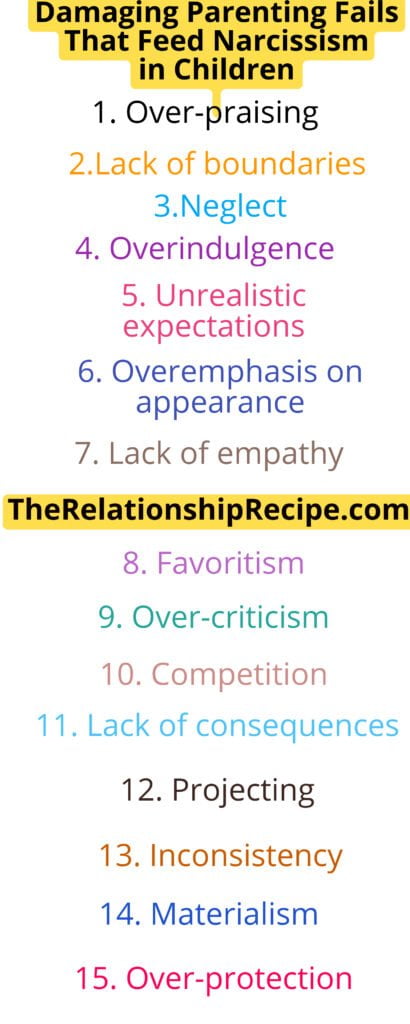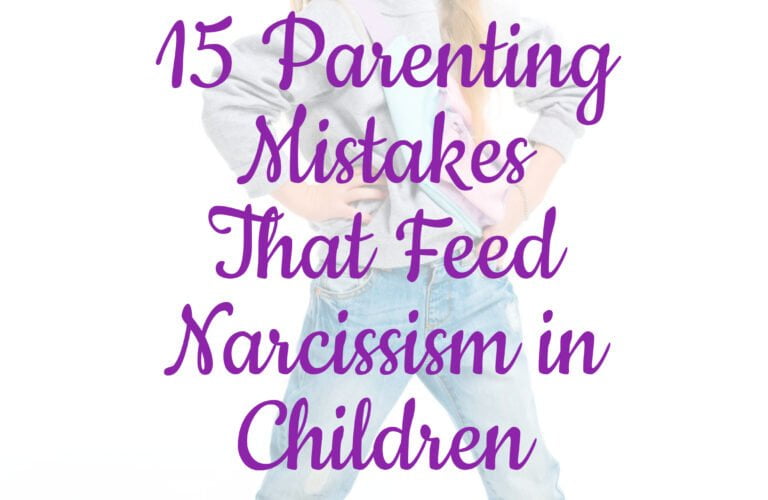Are you unknowingly making these 15 parenting mistakes that could be fueling narcissism in your children?
Narcissists. The word seems so overused these days. You go in to any relationship forum, and it seems everyone is either married to or divorcing a narc. Surely, there can’t be THAT many of them out there…right?
Without an official, professional diagnosis, it’s difficult to tell for sure – but it’s safe to say there are a lot of people out there with narcissistic tendencies.
If this is true, have you ever wondered how narcs are “created?” Most of us have an inkling that it must obviously come from childhood. How much of the blame can we actually put on parents?
Quite a bit, as it turns out. Not to say ALL of the blame should be put on parents, as one’s childhood can be complicated – and even more so when we try to get in to someone’s head. Additionally, childhood experiences, peer interactions, and societal influences can all play a role in the development of narcissistic traits.
Parenting is an arduous journey filled with challenges, triumphs, and moments of self-doubt. We all make mistakes along the way, but some parenting failures can have profound consequences.
One such consequence is the potential development of narcissistic traits in children. Narcissism is a complex personality trait that often emerges in childhood and can be influenced by parenting practices.
In this article, we will explore the questions surrounding this issue, including whether a parent can turn a child into a narcissist, what factors contribute to narcissism in children, and how to discipline a narcissistic child.
We will also provide 15 ways in which parenting failures can contribute to the development of narcissistic tendencies.

Can a Parent Turn a Child into a Narcissist?
Narcissism is a personality trait characterized by an inflated sense of self-importance, a constant need for admiration, and a lack of empathy for others.
While genetics and environmental factors both play a role in the development of narcissistic traits, it is essential to recognize that parents can influence their children’s personality development, but they do not directly turn them into narcissists. Rather, certain parenting behaviors and failures can contribute to the emergence of narcissistic tendencies in children.

15 Parenting Mistakes That Can Turn a Child into a Narcissist
Several factors can contribute to the development of narcissism in children:
1. Over-praising: Constantly showering a child with praise and admiration can create an unrealistic sense of self-importance, leading to narcissistic tendencies.
2. Lack of boundaries: Failing to set and enforce appropriate boundaries can make a child believe they are entitled to special treatment and that rules do not apply to them.
3. Neglect: Emotional or physical neglect can lead children to develop narcissistic traits as they seek to compensate for the lack of attention and care from their parents.
4. Overindulgence: Giving children everything they want without them having to earn it can create a sense of entitlement, a hallmark of narcissism.
5. Unrealistic expectations: Pushing a child too hard to achieve and succeed can lead to a constant need for validation and admiration.
6. Overemphasis on appearance: Focusing solely on a child’s physical appearance can contribute to a shallow self-identity and a reliance on external validation.
7. Lack of empathy: Parents who do not model or teach empathy may inadvertently encourage their children to disregard the feelings and needs of others.

8. Favoritism: Showing favoritism toward one child over others can create rivalry and potentially narcissistic behavior as children vie for attention and approval.
9. Over-criticism: Constant criticism can lead to an extreme fear of failure and a desire for perfection, often seen in narcissistic individuals.
10. Competition: Encouraging children to constantly compete with others can cultivate a mindset that prioritizes winning at all costs, often to the detriment of empathy and cooperation.
11. Lack of consequences: Failing to enforce consequences for misbehavior can lead children to believe they are immune to rules and accountability.
12. Projecting: Parents who project their own unfulfilled desires and ambitions onto their children can inadvertently encourage narcissistic traits.
13. Inconsistency: Inconsistent parenting can create confusion and instability, leading children to seek validation from external sources, such as social media.
14. Materialism: Overemphasizing material possessions and wealth can encourage children to equate their self-worth with their possessions.
15. Over-protection: Being overly protective can lead children to believe they are exceptionally fragile and important, creating narcissistic tendencies.

Can Parental Neglect Cause Narcissism?
Neglect, whether emotional or physical, can indeed contribute to the development of narcissistic traits in children. When children do not receive the attention, love, and care they need from their parents, they may seek external validation and develop a sense of entitlement to compensate for their unmet emotional needs. Neglected children may become self-centered and exhibit a lack of empathy for others, both common characteristics of narcissism.
Do Narcissistic Parents Put Kids into Roles That Turn Them into Narcissists as Well?
Yes, it is possible for narcissistic parents to put their children into roles that encourage narcissistic traits. For example, in dysfunctional families with narcissistic parents, children may take on roles such as the “golden child” or the “scapegoat.”
The golden child receives excessive praise and is expected to maintain the family’s image, potentially leading to narcissistic tendencies. On the other hand, the scapegoat may develop a need for external validation and exhibit narcissistic traits as they strive to prove themselves in the face of constant criticism.

Did I Turn My Child into a Narcissist?
It is essential to approach this question with caution. Parenting is a complex interplay of various factors, and narcissism in children does not result from a single parenting error.
Instead, it often stems from a combination of factors, including genetic predispositions and environmental influences. If you suspect that your child exhibits narcissistic traits, it is important to seek professional guidance and support rather than placing blame on yourself.
Origins of Narcissism in Children
Narcissism in children can originate from a mix of genetic, environmental, and parenting factors. Some children may be genetically predisposed to narcissistic traits due to their family history, but environmental factors, particularly parenting, can either enhance or mitigate these tendencies.
Furthermore, the development of narcissistic traits can be influenced by childhood experiences, interactions with peers, and societal influences.
Does “Helicopter” Parenting Contribute to Kids Growing up to be a Narcissists?
Helicopter parenting, characterized by excessive control, hovering, and over involvement in a child’s life, can indeed contribute to the development of narcissistic traits in children. This style of parenting often stems from a well-intentioned desire to protect and support one’s child, but it can inadvertently create a sense of entitlement and a lack of self-sufficiency.
One key factor is the constant focus on the child’s needs, achievements, and emotional well-being. This hyper-attention can lead children to believe that they are exceptionally special and deserving of constant validation. Helicopter parents may rescue their children from minor challenges, shielding them from any form of failure. As a result, children may grow up without the resilience and coping skills necessary to face life’s challenges, which can contribute to narcissistic tendencies.
Additionally, the lack of boundaries in helicopter parenting can prevent children from developing a sense of independence and personal responsibility. They may come to expect that their parents will always be there to solve their problems and cater to their needs, reinforcing a self-centered worldview.
While not all children of helicopter parents will become narcissists, this parenting style can increase the likelihood of narcissistic traits emerging. It is important for parents to strike a balance between providing support and guidance while allowing their children the space to learn and grow on their own, encouraging a healthier sense of self and empathy towards others.

How to Discipline a Narcissistic Child
Disciplining a narcissistic child requires a delicate balance of setting boundaries and promoting empathy and self-awareness. Here are some strategies for disciplining a child with narcissistic tendencies:
1. Set clear and consistent boundaries: Ensure your child understands the rules and consequences for their actions.
2. Teach empathy: Encourage your child to consider the feelings and perspectives of others.
3. Promote self-reflection: Help your child develop self-awareness by discussing their behavior and its impact on others.
4. Encourage selflessness: Engage in activities that encourage cooperation, sharing, and acts of kindness.
5. Seek professional help: Consult with a child psychologist or therapist who specializes in narcissism or related issues.
Parenting plays a significant role in shaping a child’s personality, and while parents do not directly turn their children into narcissists, certain parenting behaviors and failures can contribute to the development of narcissistic traits.
Recognizing these potential pitfalls and addressing them is essential in encouraging healthy and balanced child development.
Seek professional guidance if you suspect your child exhibits narcissistic tendencies, and remember that effective parenting involves love, empathy, consistency, and setting appropriate boundaries.
Sources:
https://www.cnn.com/2015/03/09/living/feat-narcissistic-kids-parents-study/index.html
# Parenting# Narcissists# Kids# parenting mistakes# raising kids
This post may contain affiliate links. I earn from qualifying Amazon purchases at no extra cost to you.




